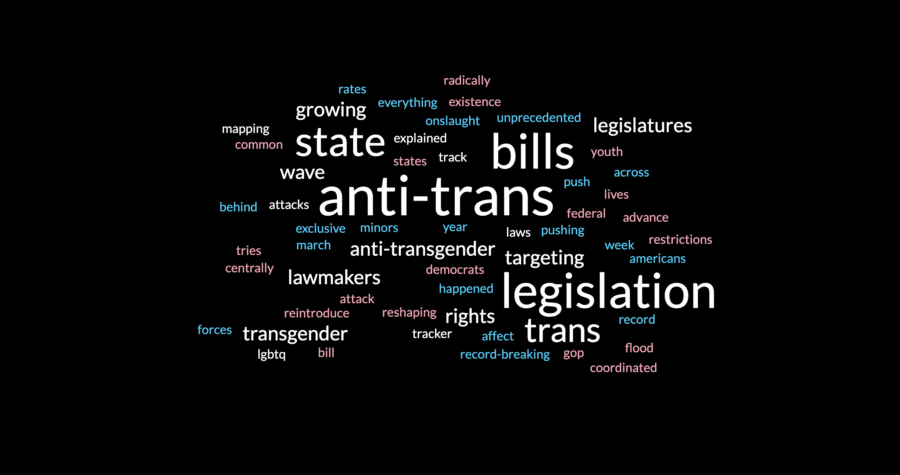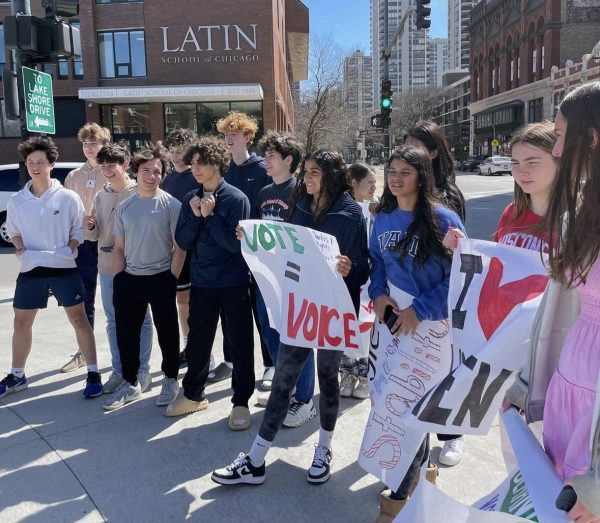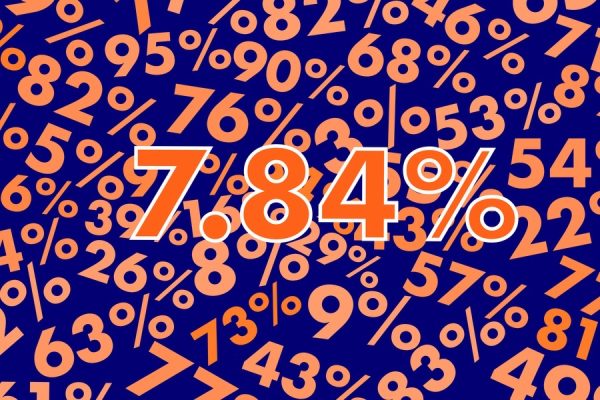Anti-Trans Legislation Reaches Record Mass
The current rise in anti-trans legislation concerns many members of Latin’s community.
In the first 100 days of 2023, more than 400 anti-LGBTQ+ bills have been introduced in state legislatures, more than twice the number of bills introduced in 2022’s entirety and nearly 10 times the number introduced just five years ago in 2018.
Members of Latin’s community are concerned by the events they’re seeing. Junior and LGBTQ+ Affinity co-head Stephen Legendre said, “What concerns me the most is not the actual bills but the support that we’re seeing, and the allowance of them to even go through with how restricting they are on human bodies.”
Similarly, Upper School Dean of Community Learning Suzanne Callis, a faculty member in the US English Department who teaches Queer Literature among other courses at Latin, said, “We’re seeing [it] in all kinds of communities with the rollback of Roe v. Wade and so many other pieces, that idea that only some people are allowed to have personal agency is concerning.”
Trans people across the country and throughout Latin find the current legislation extremely dangerous. Freshman Marc Abrahams said, “Any legislation passed against trans people makes it more socially and culturally okay to be transphobic.”
Similarly, US Computer Science Department Chair and LGBTQ+ Affinity advisor Ash Hansberry said, “I think anytime we’re causing someone to decide ‘Am I safe to exist?’ that should alarm all of us, even if it doesn’t affect us individually.”
Within the news, social media, and many state legislatures across the country, the very validity of trans identity and culture is being questioned. Ms. Callis said, “If all you’re ever hearing about yourself is that you don’t have value, you don’t get a say in your own life, you don’t know who you are, and if you really double down on knowing who you are, well then something’s wrong with you, that’s not something we should ever be saying to anybody.”
Although Illinois has many protections for transgender individuals, and, in fact, is one of few states not considering any anti-trans legislation at the moment, members of Latin’s trans community still feel threatened by the bills being considered. Marc said, “Chicago has so many protections already put in place, [but] that violence still carries over no matter where you are.”
In terms of offering support, even small gestures can be of help. Mx. Hansberry said, “There are trans people at Latin, and trans people in Chicago, and trans people in the state of Illinois whose life is improved by all of us just being welcoming, friendly, supportive people.”
“You don’t have to be trans to be scared by these bills,” Stephen said, noting that community members can be helpful by “showing support and respect for those people, and being there and being able to listen and have meaningful conversations about it.”
Ms. Callis said that when it comes to these discussions, respect starts with “allowing people to be themselves and tell you who they are before you assume who they are. These are basic kindness things—I think it’s more about making sure that we are allowing everyone to have that power and not just people who we think match with how we see them.”
The reasons for this rise in anti-transgender legislation are manifold. For one, US English teacher and Diversity, Equity, and Inclusion Curriculum Coordinator Brandon Woods said, “Whenever a marginalized community starts to get more attention, that’s when the negative backlash tends to happen.” Increased transgender visibility—with more transgender actors, public figures, and content creators—means more backlash.
For conservative politicians, the bills serve the practical purpose of ensuring votes from the religious right, and showing opposition to progressive politics. In that sense, trans rights have become a cultural wedge, or an issue that splits apart a population group. Mr. Woods said, “Typically when you engage in that type of politics, you need to have a very ‘us versus them’ dichotomy.” This dichotomy has pushed all 1.3 million adults and 300,000 children in the U.S. who currently identify as transgender into political crossfire.
Additionally, many faculty members, as well as outlets like The New York Times, perceive the current rise in anti-transgender legislation to function as a moral panic, or exaggerated concern within a society over a perceived threat to its traditional values. Mx. Hansberry said, “It has many of the hallmarks of moral panic arguments that have been made in the past. Obviously, the experience of trans people is different than the experience of other marginalized communities, but it’s not new for there to be a moral panic when marginalized communities are gaining broader recognition.”
Moral panics often hinge on and manipulate fear, like the Red Scare, the Salem Witch Trials, or public outcry during the HIV/AIDS epidemic. Mx. Hansberry said, “I’m sure that some people involved in some of [this] legislation at some point had a real question or concern, but at this point, it’s way past that.”
The current rise is also part of a broader trend to “eat away at people’s rights beyond just trans people’s rights,” Mx. Hansberry said.
As for the legislation at hand, the American Civil Liberties Union (ACLU) categorizes proposed laws into seven categories: accurate IDs, civil rights, free speech & expression, healthcare, public accommodation, schools & education, and other anti-LGBTQ+ bills.
Legislation that falls into the accurate IDs category limits the abilities of transgender people to update their gender on IDs or other public records. Many states, for example, require certification from a medical provider to update gender on a driver’s license.
When speaking about this process, Ms. Callis said, “[It is] demanding the person to be comfortable enough with a system that isn’t necessarily designed to help them, to tell this to multiple people, to ask for help, to get to the tier they need to.” She continued, “We’re saying that that person gets to tell you yes or no. It’s not that you get to that approval state and it’s a guaranteed yes—they could still tell you no, in which case you’re back to the beginning and you’ve gone through a relatively traumatic process.”
Anti-LGBTQ+ civil rights legislation makes it legal for medical providers, businesses, and workplaces to turn away transgender people or refuse them equal treatment, similar to the recent Supreme Court cases on whether cake shops and website designers need to make wedding cakes or marriage websites for same-sex couples. Likewise, legislation reducing free speech prevents LGBTQ+ people from being themselves, expressing themselves, and hearing similar voices, often through acts like bans of books on queer topics and other forms of censorship.
The current drag bans are also examples of legislation that limits free speech and expression, with politicians often citing protecting children from explicit content as the reason behind these bills. Kevin West, the author of a recent Oklahoma bill that could result in felony charges for drag performers, said, “It is crystal clear that what we are trying to do is protect minors.”
Opposing politicians point out hypocrisy within these bills, as several recent incidents in which children have been exposed to explicit content have received no backlash. Opponents are also concerned that these bills have the potential to target not only explicit performances, but all drag.
Bills across the country are targeting gender-affirming healthcare, particularly healthcare for transgender youth. This legislation reaches far and wide into medicine, with legislation passed on everything from health insurance restrictions for transgender people to bans on hormone blockers for teens.
Often, in the passing of these bills, legislatures cite concerns about perceived dangers of gender-affirming healthcare or negative long-term effects for youth who transition. These concerns, however, create a double standard between transgender and cisgender children. Ms. Callis said, “We don’t question whether a young person who identifies as cis knows themselves; we are assuming that that is what it means to know yourself.”
Legislation targeting public accommodation seeks to restrict trans people from using public spaces like bathrooms and locker rooms. Often, arguments for these bills hinge on the opinion that having transgender women in women’s spaces poses a danger to cisgender women, although research has found no increased safety risks associated with allowing people to use the bathroom of the gender they identify with.
Finally, bills surrounding education often seek to prevent trans students from participating in athletics or restrict discussion of LGBTQ+ topics. However, no matter which category these bills fall into, they all share the common thread of affecting queer people and, Mx. Hansberry said, “restricting access to lots of normal parts of life.”

Scarlet Gitelson (‘26) is delighted to be serving as one of this year’s News Editors. Within her writing, she seeks to explore and understand Latin’s...



















































Mr. Joyce • Apr 19, 2023 at 4:05 pm
Nice work bringing together all of this info and all of these community voices, Scarlet!